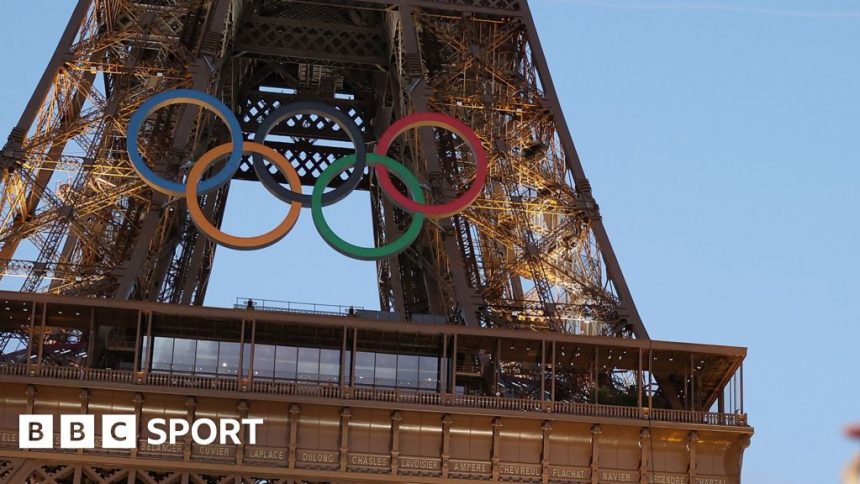‘Cardboard beds and tables made from shuttlecocks’ – greenest Olympics ever?
‘Climate change is an extremely serious threat’ – IOC President Bach
-
Published
The organising committee of Paris 2024 has vowed to make it the greenest Games in Olympic history, with half the carbon footprint of London 2012 and Rio 2016.
London 2012 had an estimated carbon footprint of 3.3m tonnes, while Rio 2016 had a total estimated footprint of 3.6m tonnes of carbon.
The 2024 Games will be held in the same city where world leaders met in 2015 to sign a number of commitments to prevent global temperatures rising by more than 1.5C and there will be lots of attention on sustainability efforts.
From tables made out of shuttlecocks to plant-based menus, Paris 2024 have announced a number of initiatives that they claim will help them reach their targets.
In an exclusive interview, Thomas Bach, president of the International Olympic Committee (IOC), told BBC Sport that sustainability is an issue “very close” to his heart.
Bach said that climate change represents an “extremely serious threat, not only for sport, but for all our lives,” adding, “this is why, with our Olympic agenda reforms, we undertook to tackle these issues by focusing on reducing our footprint.”
Existing stadiums, not new buildings
The 5,000m2 roof of the new aquatic centre will be covered with solar panels
Before London 2012, six new stadiums were built. Rio built 10 permanent new sites and seven temporary ones.
Of the 35 stadiums housing events at Paris 2014, only two will be new and purpose-built – an aquatics centre and an arena for badminton and rhythmic gymnastics.
The organisers claim these will be built using “low-carbon construction methods”. The aquatic centre will include seats made from “recycled local plastic waste”, with wood used throughout construction.
-
-
Published3 days ago
-
-
-
Published17 hours ago
-
Cardboard beds and tables from shuttlecocks
A typical bedroom in the athletes’ village
The beds in the athletes’ village at Tokyo 2020 were constructed using recycled cardboard and went viral when American runner Paul Chelimo claimed on social media they were “aimed at avoiding intimacy among athletes” because they would collapse under the weight of more than one person.
That claim was debunked and the same manufacturer is also providing the beds for Paris 2024.
Also in the athletes’ area, there will be “coffee tables made from recycled shuttlecocks, poufs from parachute canvas and chairs from recycled bottle tops”, according to organisers.
Double the amount of plant-based food
As well as promising to double the proportion of plant-based ingredients available to spectators and the workforce compared to London 2012 and Rio 2016, the organising committee for the Games has also promised to source 80 per cent of ingredients from “local agriculture production” in order to reduce transport.
Place de la Concorde, which will host urban sports, will exclusively serve vegetarian food.
With a food culture synonymous with beef bourguignon and steak tartare, the move towards plant-based food is a significant one.
Electric v diesel
At previous Games, some stadiums had to rely on diesel generators for power. Paris organisers have instead promised to focus on connecting stadiums to the public electricity network. Those connections will also last beyond the Games.
The Commission for a Sustainable London 2012 found in a report following those Games that the Olympic Broadcasting Service (OBS) had engaged in “unnecessary deployment of generators”, external because of “gross overestimates of energy consumption”.
Georgina Grenon, environmental excellence director for Paris 2024 said recently that at London 2012, four million litres of diesel were burned just for electricity purposes.
Turning Paris into a cycling city
There have been proposals in recent years to limit the use of cars in Paris
Transport between stadiums has been considered, with a 60km cycling network linking all of the Olympic venues – 30km of which has been built in the run-up to the Games.
The challenges – heat, overseas travel and water pollution
A report by University of Portsmouth scientists Rings of Fire, external has warned about the effects of extreme heat on athletes. It found that average July and August temperatures had increased by 2.4°C and 2.7°C respectively over the 100 years since the Olympics was last held in France in 1924.
The Olympic village was originally designed to be free of air conditioning, but in light of concerns about heat, 2,500 temporary cooling units will now be fitted.
There were doubts as to whether triathlon and open water swimming events could be held in the River Seine after it was revealed last month it had failed water quality tests.
However, last week Paris Mayor Anne Hidalgo and other members of the Paris Olympic committee swam in the river to prove it was safe.
The biggest challenge to Paris meeting the targets is likely to come from spectator travel, which can account for about 80% of a sporting event’s emissions.
At London 2012 organisers set a target of selling 75% of tickets to UK fans.
By contrast, this year’s Olympics will be the first where tickets have been sold centrally to all fans worldwide at the same time, which could result in greater numbers of international fans flying to the Games.
Bach told BBC Sport the Games must balance considerations about carbon reduction against “what great impact the Games have with regard to peace, with regard to health, with regard to bringing the entire world together”.
In 2023, France banned short-haul flights where train alternatives exist.
Paris 2024: Marathon runner trying to prepare for extreme heat
Criticism of sponsors
Coca Cola, the longest-standing partner of the Olympics, was named the world’s leading plastic polluter, external in a recent survey by non-governmental organisation Break Free From Plastic.
Toyota has committed to providing 500 hydrogen-fuel cell vehicles to “the Olympic and Paralympic family”, with zero tailpipe emissions. However, a group of scientists, academics and engineers have penned an open letter to the IOC, external arguing that hydrogen vehicles require three times more electricity than battery electric vehicles.
Bach told BBC Sport that the use of EV, hybrid and hydrogen-powered vehicles within the fleet for Paris 2024 sent “a very strong signal with regard to reducing the footprint of the Games”.
He added that Coca Cola will use “a beverage fountain” for catering at the Games, which “will reduce their plastic used by 50%”.
The Games plan to serve beverages in reusable plastic packaging at scale. However, French newspaper Le Monde has reported, external that 40% of drinks will still be served in single-use plastic bottles.
More than 100 athletes have signed an open letter, external calling on Coca Cola and Pepsi to stop selling single-use plastic bottles and promote reusable products.
Related Topics
-
-
Published17 April
-
-
-
Published4 days ago
-
-
-
Published26 July 2023
-






